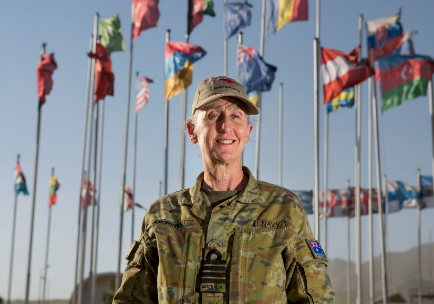Defence aims to integrate a gender, peace and security (GPS) perspective across the breadth and complexity of planning, operations and international engagement.
Background
The United Nations Security Council Resolution (UNSCR) 1325 on Women, Peace and Security (WPS) affirms the role of women in the prevention and resolution of conflicts and in all efforts for the promotion of peace and security.
The Australian Government is committed to the implementation of the resolution.
In April 2021, the Government released the Second Australian National Action Plan (NAP) on Women, Peace and Security 2021-2031. The plan renews the Government's commitment to the full and equal participation of women and girls in Australia's peace and security arrangements.
Defence continues to prioritise the WPS agenda and recognises that women make an indispensable contribution to peace and confidence building. Moreover, women provide an invaluable perspective in every aspect of then planning and conduct of military operations, across the entire spectrum of conflict.
Defence seeks to provide regional leadership via supporting inclusive conflict prevention, conflict resolution, peace processes and post conflict state reconstruction. These activities enhance the capacity, of Australia and its regional partners, to develop gender sensitive interventions that support UNSCR 1325 WPS principles.
Defence GPS Mandate
Defence operationalises the priorities outlined in the NAP through the Defence Gender, Peace and Security Mandate (2020-2030).
Defence Gender, Peace and Security Mandate (2020-2030) (PDF, 5.05 MB)
The mandate aligns Defence's actions with Australia's ambitious goals on gender equality, human rights and women and girls' meaningful participation in peace and security processes. It represents a consolidation of Defence activities and reflects a growing maturity in the adoption of UNSCR 1325 WPS principles.
The mandate drives Defence implementation efforts across 6 lines of effort spaning core areas of Defence:
- Policy and doctrine
- Education and training
- Personnel
- Mission readiness and effectiveness
- International engagement
- Governance and reporting
International engagement
International engagement is a key priority for Defence. Integrating a gender perspective across the breadth of its international engagement activities is important for achieving Defence’s strategic outcomes.
A gender perspective can enhance Defence's understanding of the security, social and economic environments of our partner countries, by:
- identifying new opportunities for international engagement
- making engagement more meaningful
- expanding partner networks
- identifying the full range of issues and pressures that shape partner countries.
Current initiatives

Walumarra Business by Chern'ee Sutton
'Walumarra Business' is an artwork that was commissioned to commemorate the 20th anniversary of UNSCR 1325. The name means 'women's business' in Kalkadoon language, and hopes to highlight Australia's contribution to GPS.
Gender Advisors and Gender Focal Point networks

A Gender Advisor is a specialist who provides advice to commanders and senior staff on gender perspectives in the planning, execution and assessment of military operations.
A Gender Focal Point (GFP) is a trained individual who has a secondary duty to integrate a gender perspective into their primary role. Networks of GFPs in each unit ensure gender is considered in Defence activities.
International mobile training teams
Defence develops and deploys instructors and mobile training teams to delivery Gender in Military Operations education to allies and international partners. The mobile training teams build capability and facilitate collaboration with international partners on GPS implementation.
Winning the Peace – Profiles of Australian Gender Advisors on Military Operations
The book 'Winning the Peace - Profiles of Australian Gender Advisors on Military Operations' is a positive and empowering collection of impactful stories that celebrate the operational achievements of Australian Defence Force (ADF) Gender Advisors since 2010.
It captures the personal experiences, contributions and achievements of 30 ADF Gender Advisors serving on operations, exercises and conflicts around the world.
The book was conceived as part of the 20-year anniversary of the United Nations Security Council Resolution 1325 on women, peace and security, which was adopted on 31 October 2000.
Winning the Peace – Profiles of Australian Gender Advisors on Military Operations (PDF, 15.02 MB)